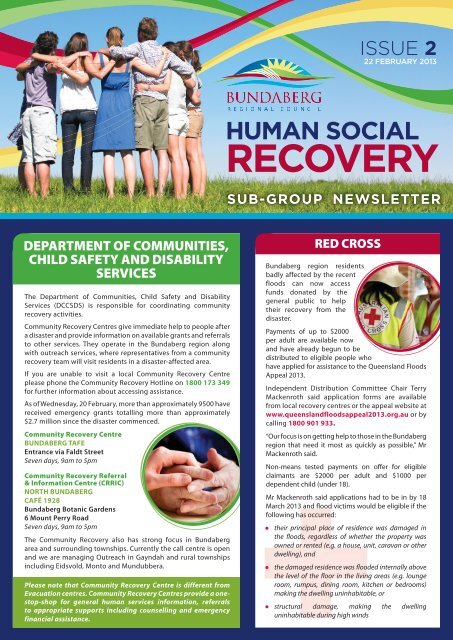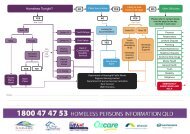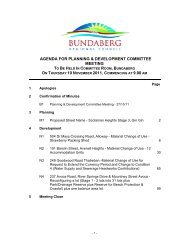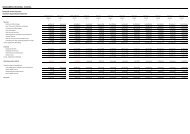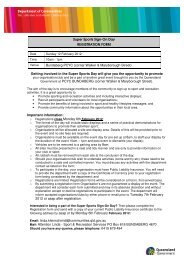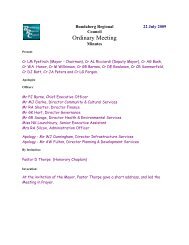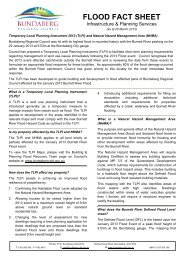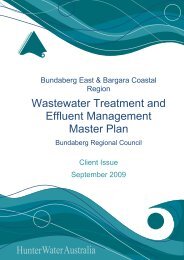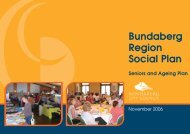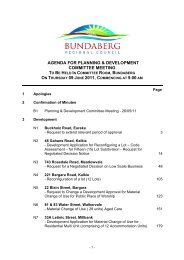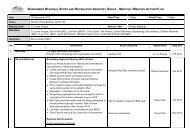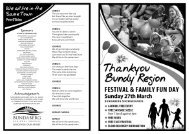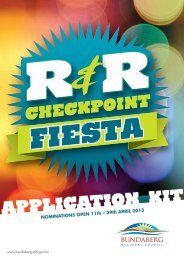RECOVERY - Bundaberg Regional Council
RECOVERY - Bundaberg Regional Council
RECOVERY - Bundaberg Regional Council
You also want an ePaper? Increase the reach of your titles
YUMPU automatically turns print PDFs into web optimized ePapers that Google loves.
ISSUE 2<br />
22 FEBRUARY 2013<br />
HUMAN SOCIAL<br />
<strong>RECOVERY</strong><br />
SUB-GROUP NEWSLETTER<br />
DEPARTMENT OF COMMUNITIES,<br />
CHILD SAFETY AND DISABILITY<br />
SERVICES<br />
The Department of Communities, Child Safety and Disability<br />
Services (DCCSDS) is responsible for coordinating community<br />
recovery activities.<br />
Community Recovery Centres give immediate help to people after<br />
a disaster and provide information on available grants and referrals<br />
to other services. They operate in the <strong>Bundaberg</strong> region along<br />
with outreach services, where representatives from a community<br />
recovery team will visit residents in a disaster-affected area.<br />
If you are unable to visit a local Community Recovery Centre<br />
please phone the Community Recovery Hotline on 1800 173 349<br />
for further information about accessing assistance.<br />
As of Wednesday, 20 February, more than approximately 9500 have<br />
received emergency grants totalling more than approximately<br />
$2.7 million since the disaster commenced.<br />
Community Recovery Centre<br />
BUNDABERG TAFE<br />
Entrance via Faldt Street<br />
Seven days, 9am to 5pm<br />
Community Recovery Referral<br />
& Information Centre (CRRIC)<br />
NORTH BUNDABERG<br />
CAFÉ 1928<br />
<strong>Bundaberg</strong> Botanic Gardens<br />
6 Mount Perry Road<br />
Seven days, 9am to 5pm<br />
The Community Recovery also has strong focus in <strong>Bundaberg</strong><br />
area and surrounding townships. Currently the call centre is open<br />
and we are managing Outreach in Gayndah and rural townships<br />
including Eidsvold, Monto and Mundubbera.<br />
Please note that Community Recovery Centre is different from<br />
Evacuation centres. Community Recovery Centres provide a onestop-shop<br />
for general human services information, referrals<br />
to appropriate supports including counselling and emergency<br />
financial assistance.<br />
RED CROSS<br />
<strong>Bundaberg</strong> region residents<br />
badly affected by the recent<br />
floods can now access<br />
funds donated by the<br />
general public to help<br />
their recovery from the<br />
disaster.<br />
Payments of up to $2000<br />
per adult are available now<br />
and have already begun to be<br />
distributed to eligible people who<br />
have applied for assistance to the Queensland Floods<br />
Appeal 2013.<br />
Independent Distribution Committee Chair Terry<br />
Mackenroth said application forms are available<br />
from local recovery centres or the appeal website at<br />
www.queenslandfloodsappeal2013.org.au or by<br />
calling 1800 901 933.<br />
“Our focus is on getting help to those in the <strong>Bundaberg</strong><br />
region that need it most as quickly as possible,” Mr<br />
Mackenroth said.<br />
Non-means tested payments on offer for eligible<br />
claimants are $2000 per adult and $1000 per<br />
dependent child (under 18).<br />
Mr Mackenroth said applications had to be in by 18<br />
March 2013 and flood victims would be eligible if the<br />
following has occurred:<br />
• their principal place of residence was damaged in<br />
the floods, regardless of whether the property was<br />
owned or rented (e.g. a house, unit, caravan or other<br />
dwelling), and<br />
• the damaged residence was flooded internally above<br />
the level of the floor in the living areas (e.g. lounge<br />
room, rumpus, dining room, kitchen or bedrooms)<br />
making the dwelling uninhabitable, or<br />
• structural damage, making the dwelling<br />
uninhabitable during high winds
UnitingCare<br />
Community - LIFELINE<br />
How do community crisis and natural<br />
disaster affect wellbeing?<br />
Everyone responds to crisis differentlysome<br />
people may appear to be managing<br />
the situation, while others may struggle<br />
to cope. However most people do<br />
experience healing and recovery and go<br />
on to rebuild their lives and develop new<br />
strengths.<br />
Some typical reactions following a<br />
community crisis may include<br />
• Feeling stressed, anxious, exhausted or<br />
confused<br />
• Feeling sad, down or tearful<br />
• Shock, denial or feeling “numb”<br />
• Anger, fear, guilt, shame or blame<br />
• Uncertainty about the future<br />
• Feeling lonely, isolated or withdrawn<br />
• Feelings of grief and loss<br />
• Physical health problems<br />
• Difficulties concentrating<br />
• Tension in personal relationships<br />
All these reactions to a crisis are normal<br />
and you may experience different<br />
emotions and reactions at different times.<br />
Call Lifeline 13 11 14 if you need to<br />
speak to someone about dealing with<br />
a community crisis or alternatively call<br />
UnitingCare Community on 4153 8400 to<br />
make an appointment to see a counsellor.<br />
QUEENSLAND HEALTH<br />
<strong>RECOVERY</strong> & RESILIENCE<br />
Looking after YOURSELF after a disaster:<br />
• Eat healthy meals.<br />
• Get regular exercise like walking. Exercise helps burn<br />
chemicals like Adrenalin that are hyping you up and it will<br />
help you become more relaxed.<br />
• Get enough rest – even if you can’t sleep. Rest helps increase<br />
reserves of strength and energy.<br />
• Establish daily routines and try to stick with them. Routine is<br />
important as it helps us to feel in control and function effectively.<br />
• Ask for support when you need it. It is not a sign of weakness and<br />
family, friends, churches and other community services are keen to help<br />
if you let them know what you want. If they do not offer it may simply be<br />
because they do not know what to do – so ask them.<br />
• Spend time with others. Do not feel like you have to talk about the trauma. Talk about<br />
everyday topics like music, the weather, cricket, or plan an outing.<br />
• Focus on your strengths and coping skills. Acknowledge your achievements and how you<br />
have, and can, deal with difficult situations.<br />
Helpful Hints to assist OTHERS Recovery:<br />
• Listen and empathise when the traumatised person wants to talk. It may be hard for<br />
them to express themselves but a sympathetic ear will minimise the chances of them<br />
‘shutting down’.<br />
• Show empathy, try not to say ‘I understand what you are feeling’ (you probably don’t,<br />
since you haven’t been through the same experience). Use phrases such as; ‘it must be<br />
difficult for you; I can see it upsets you; is there anything I can do for you’.<br />
• Spend time with the traumatised person. There is no substitute for personal presence.<br />
• Continue to do the usual things that people do together. Do not force conversation<br />
about the traumatic event or try and be a counsellor. Just being with people who care<br />
about them is very important for traumatised people. Equally, respect<br />
the person’s need for privacy and private grief at times.<br />
• Do not use statements such as ‘lucky it wasn’t worse; at<br />
least you have your health; come on get over it it’s done<br />
now’. People are not consoled by such statements. en<br />
Tell them that you’re sorry they were involved in<br />
such an event, and that you want to understand and<br />
assist them.<br />
• Re-assure them that they are now safe.<br />
• Make positive statements, reaffirm how much<br />
they are appreciated, offer praise, and make a<br />
point of saying something nice each day. Positive<br />
interactions make a difference.<br />
QUEENSLAND HEALTH: THE CENTRE FOR TRAUMA LOSS AND<br />
DISASTER <strong>RECOVERY</strong> (2011).<br />
TELEPHONE 1300 883 699<br />
EMAIL ceo@bundaberg.qld.gov.au<br />
WEBSITE www.bundaberg.qld.gov.au<br />
ADMINISTRATION CENTRE: 186 - 190 BOURBONG STREET, BUNDABERG<br />
SERVICE CENTRES AT: BARGARA, CHILDERS AND GIN GIN<br />
COUNCIL OFFICE HOURS: 8.15am to 4.45pm MONDAY TO FRIDAY<br />
DEPARTMENT OF HOUSING<br />
AND PUBLIC WORKS<br />
The Department of Housing and Public Works provides housing<br />
assistance to low to moderate income families and individuals.<br />
Should you require housing assistance please contact the<br />
<strong>Bundaberg</strong> Housing Service Centre on (07) 4131 5990 or free call<br />
1800 809 835.<br />
Temporary housing may be available for families or<br />
individuals affected by the recent floods.<br />
You can also contact the Housing Hot<br />
Line on 1800 004 495 should<br />
you require further<br />
assistance or advice.


